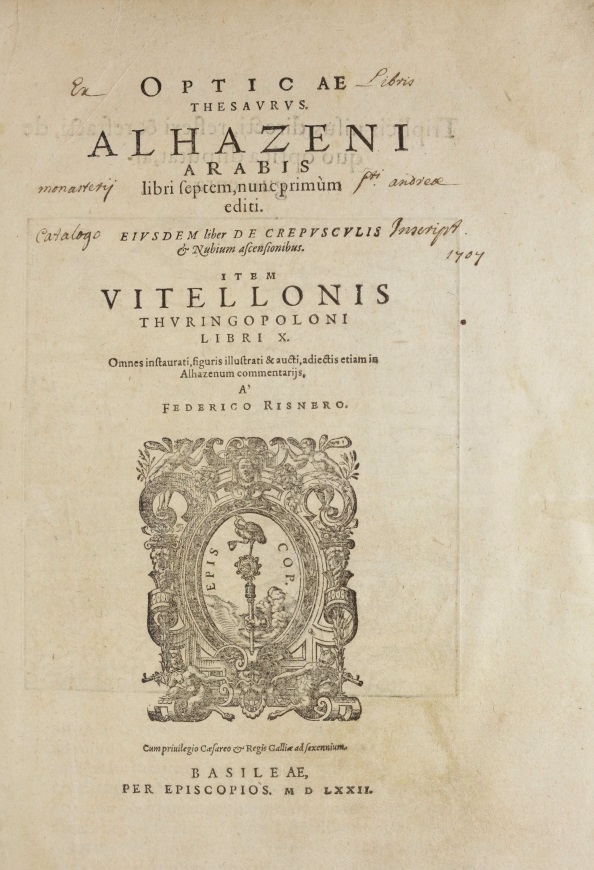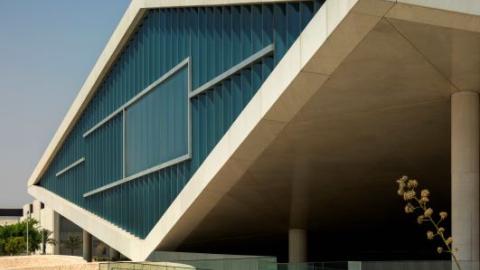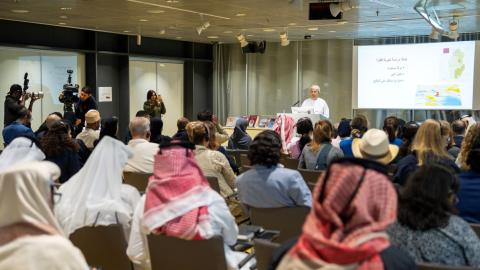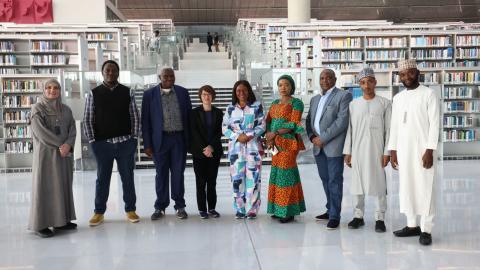
Born during the creative era known as the Islamic Golden Age, Ibn Al Haytham (965 – 1040) is widely regarded as one of the most prolific thinkers of all time. Dedicating his life to the study of optics and light, the 11th century scientist’s crucial discoveries made a significant contribution to what is today known as the modern scientific method.
QNL`s Qatar Digital Library (QDL) is home to thousands of manuscripts and books of many Muslim scholars and scientists, notably Ibn Al Haytham, chosen by the United Nations Educational, Scientific and Cultural Organisation (UNESCO) as the revered icon of its celebration of the International Year of Light and Light-Based Technologies (IYL 2015).
An international conference took place on September 14th and 15th, 2015 focusing on the accomplishments of the Islamic civilisation in its Golden Age and the life and works of Ibn Al Haytham.
The exhibition, which was a part of the conference, is a joint initiative between Qatar National Library (QNL), Qatar National Commission to UNESCO and UNESCO Doha Office. Through the exhibition, QNL highlighted selected digitised items of the famous scholar Ibn Al-Haytham from QNL’s heritage collection and Qatar Digital Library (QDL).
The IYL 2015 honoured the “Father of Modern Optics” and the millennial anniversary of his most revered work, a seven-volume treatise on optics, Kitab Al Manazer (Book of Optics), which laid the foundation for modern physics of optics and drastically changed the understanding of light and how the concept of vision functions is understood.
The IYL 2015 is a worldwide year-long initiative which aims to create global awareness on the significance of optics and vision and the profound impact it has had on human civilisation. The initiative highlights how light-based technologies contribute to social development and how advancements in the field have assisted in alleviating many current global issues.


QNL, a member of Qatar Foundation for Education, Science and Community Development (QF), celebrates the value of heritage and knowledge produced by Arab and Islamic civilisation. Through its cooperation with the British Library, the QDL houses over half a million digitised archival and manuscript material related to Qatar, the Gulf region and Arab and Islamic sciences. Many of the pioneer’s works including On Light, On Eclipse, On Lunar Light, On the Light of Planets, and On the Configuration of the World, are accessible through QDL.
By granting access to the digital copies of many of Ibn Al Haytham’s original works, QNL sheds much-deserved light on the great thinker’s profound discoveries. Ibn Al Haytham serves as a significant reminder to youth, not only in Qatar but across the Arab world that their great ancestors bestowed invaluable knowledge on humanity. These innovations and notable advancements in science inspired young minds to follow in the footsteps of their ancestors by pursuing the study of science and research-based careers.
QNL, by making many of Ibn Al Haytham works accessible to the whole world through its QDL portal and Heritage Collection, highlights his legacy, and the golden age of Islamic civilisation, thus inspiring future generations and asserting its pioneering role and vision of bridging with knowledge Qatar’s and the Arab and Islamic world’s heritage and future.
QNL is a world class modern institution that functions as a national library, research-level university library and a metropolitan public library for the digital age. QNL is also home to the Heritage Collection, founded in the early 1980s as part of H.E. Sheikh Hassan bin Mohammed bin Ali Al-Thani’s vision to create, and make accessible, a landmark repository of Qatar and regional history in the heart of Doha.
The Heritage Collection is a unique contribution to Qatar’s cultural landscape. Specifically, the Collection’s Early Arabic printing section contains some of the first Arabic books printed on presses in Shweir (Lebanon), Aleppo, Mosul, Bulaq, and in the Hijaz.
QNL`s Qatar Digital Library (QDL) is home to thousands of manuscripts and books of many Muslim scholars and scientists, notably Ibn Al Haytham, chosen by the United Nations Educational, Scientific and Cultural Organisation (UNESCO) as the revered icon of its celebration of the International Year of Light and Light-Based Technologies (IYL 2015).
An international conference took place on September 14th and 15th, 2015 focusing on the accomplishments of the Islamic civilisation in its Golden Age and the life and works of Ibn Al Haytham.
The exhibition, which was a part of the conference, is a joint initiative between Qatar National Library (QNL), Qatar National Commission to UNESCO and UNESCO Doha Office. Through the exhibition, QNL highlighted selected digitised items of the famous scholar Ibn Al-Haytham from QNL’s heritage collection and Qatar Digital Library (QDL).
The IYL 2015 honoured the “Father of Modern Optics” and the millennial anniversary of his most revered work, a seven-volume treatise on optics, Kitab Al Manazer (Book of Optics), which laid the foundation for modern physics of optics and drastically changed the understanding of light and how the concept of vision functions is understood.
The IYL 2015 is a worldwide year-long initiative which aims to create global awareness on the significance of optics and vision and the profound impact it has had on human civilisation. The initiative highlights how light-based technologies contribute to social development and how advancements in the field have assisted in alleviating many current global issues.


QNL, a member of Qatar Foundation for Education, Science and Community Development (QF), celebrates the value of heritage and knowledge produced by Arab and Islamic civilisation. Through its cooperation with the British Library, the QDL houses over half a million digitised archival and manuscript material related to Qatar, the Gulf region and Arab and Islamic sciences. Many of the pioneer’s works including On Light, On Eclipse, On Lunar Light, On the Light of Planets, and On the Configuration of the World, are accessible through QDL.
By granting access to the digital copies of many of Ibn Al Haytham’s original works, QNL sheds much-deserved light on the great thinker’s profound discoveries. Ibn Al Haytham serves as a significant reminder to youth, not only in Qatar but across the Arab world that their great ancestors bestowed invaluable knowledge on humanity. These innovations and notable advancements in science inspired young minds to follow in the footsteps of their ancestors by pursuing the study of science and research-based careers.
QNL, by making many of Ibn Al Haytham works accessible to the whole world through its QDL portal and Heritage Collection, highlights his legacy, and the golden age of Islamic civilisation, thus inspiring future generations and asserting its pioneering role and vision of bridging with knowledge Qatar’s and the Arab and Islamic world’s heritage and future.
QNL is a world class modern institution that functions as a national library, research-level university library and a metropolitan public library for the digital age. QNL is also home to the Heritage Collection, founded in the early 1980s as part of H.E. Sheikh Hassan bin Mohammed bin Ali Al-Thani’s vision to create, and make accessible, a landmark repository of Qatar and regional history in the heart of Doha.
The Heritage Collection is a unique contribution to Qatar’s cultural landscape. Specifically, the Collection’s Early Arabic printing section contains some of the first Arabic books printed on presses in Shweir (Lebanon), Aleppo, Mosul, Bulaq, and in the Hijaz.



